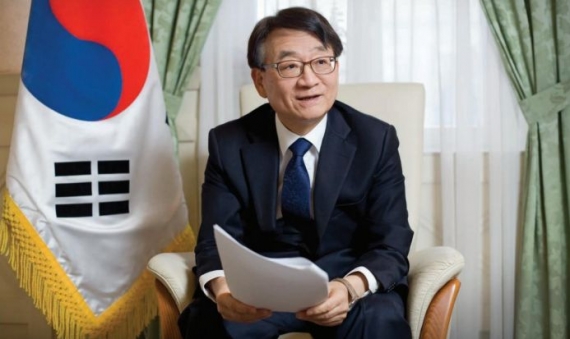The March issue of Diplomacy&Trade presented a special compilation of ties between the Republic of Korea and Hungary. In the leading article, Korean ambassador Kyoo-sik Choe talked about the various ascpects of relations and the 'Olympics of Peace'.
Next year, the Republic of Korea and Hungary celebrate the 30th anniversary of entering an agreement on diplomatic relations. Ambassador Choe highlights to Diplomacy&Trade that “over these close to three decades, bilateral relations have been cherished, in an exemplary manner, in the political, economic, cultural and defense areas. Next year, I would like to elevate these ties to the next level in order to deepen the bilateral relations.”
He adds that “of course, this 30th anniversary does not only mean that we will offer colorful programs of celebration to the population in the two countries but that we would also like to make the present cooperation even tighter. Therefore, from now on, I would like to be very much involved in the preparatory work. My goal is not only to celebrate but also make relations wider and stronger in as many fields as possible.”
Building on a legacy
During the tenure of the previous Korean ambassador, Geun-hyeong Yim, bilateral relations were greatly developed. To build on the legacy of his predecessor and further enhance Korean-Hungarian ties, Ambassador Choe first mentions the fields of science and technology and that of the pharmaceutical and medical industries as well as defense cooperation. “Working together in science and technology covers the areas of research and development (R&D) and innovation. The Republic of Korea has developed innovations in several fields and when these are introduced to Hungarian researchers of natural science, it can create a special synergy of development. As an example, this February, Hyundai Electric inaugurated a new technology center in Budapest. This March, another Korean firm, SK Innovation will hold the groundbreaking ceremony of their new factory in Komárom, west of Budapest, while at the end of March, the 9th bilateral science and technology joint committee will hold a session here in Budapest. Also, the Visegrád Four (V4) countries will hold a think.BDPST conference where the Republic of Korea will be the guest of honor.”
The Ambassador says he heard that in Hungary the pharmaceutical and biotechnology industries are the most developed among the countries of East Central Europe. He quotes 2016 statistics suggesting that “the pharmaceutical industry showed a growth of 18.9%. In that year, Hungary imported, from the Republic of Korea, products in the value of USD 950 million with pharmaceutical goods and pesticides as the main items. A new product, developed as a result of cooperation between the Korean company Celltrion and Hungary’s Egis, became a big success with huge quantities sold in Europe and the countries of the former Soviet Union.”
During the term of Ambassador Yim, Hungary and the Republic of Korea saw great development in defense cooperation, including the establishment of the office of military attaché and the signing of an agreement between the two countries on the exchange and mutual protection of classified military information. “So, the legal framework is there; now, during my term as ambassador, the task is to concentrate on practical cooperation.
In 2014, the Hungarian government announced a tender for purchasing helicopters. It was followed by talks between the Korean and Hungarian governments but then, things died down. This January, however, the chief-of-staff of the Hungarian Army said that the government would buy 40 choppers. Korean suppliers are among the interested suppliers,” he adds.
Successful investments
Korean investments in Hungary, Hankook Tire, Samsung, LG and other Korean firms, play an important role in bilateral economic ties and they also contribute to Hungary’s economic performance.
Ambassador Choe explains that in the past three decades, there has been growth in several areas of bilateral relations but the greatest achievements can definitely be seen in economic ties. “According to the latest statistics available (2016), the number of jobs provided by Korean companies in Hungary was 7,700 and the sales of these firms amounted to EUR 3.2 billion. Of course, these companies contribute to the development of the Hungarian economy, including the creation of jobs and the transfer of high technology. At the same time, the presence of Korean companies in this country also means a bridgehead for them to the market of the European Union. I would also like to emphasize that Korean companies do not repatriate the profit they make in Hungary but rather re-invest it in the development of the company.”
As regards the social responsibility policies of the corporate sector, the Ambassador points out that Korean companies have contributed a lot to local communities in Hungary. He mentions the example of Hankook Tire that provided tires for Hungarian ambulance cars free of charge, a donation of about 10,000 tires. The Samsung Electronics factory in Jászfényszaru, SE of Budapest, gave various information technology devices to the local government to support the ‘smart school’ initiative in children’s education. He is of the view that “the reinvestment of the profit and these CSR activities on the part of the Korean companies is a kind of return to the Hungarian governments for providing a favorable business environment, good conditions for investment in the country.”
He highlights that Hungary is located in Europe’s geographical center, providing good access, on roads and railroads, to forward goods, to some twenty countries in the region. “In other words, the country’s location is excellent from the point of view of logistics. Of course, the skilled and relatively cheap labor is another attractive feature in Hungary. It is also favorable that the corporate tax has been reduced to 9%, while the rate of social security contributions to be paid by firms went down from 27% to 19.5%. These favorable conditions mean a lot to Korean companies in making their investment decisions – like that of the already mentioned SK Innovation, which invests USD 770 million in Komárom. According to the Hungarian Ministry of Foreign Affairs and Trade, last year, 96 companies invested in Hungary a total amount of EUR 3.5 billion and 3 of those 96 companies were Korean. While in 2017, the number of Korean firms operating in Hungary was around 50, this number is now over 90 and there are several more that consider Hungary an investment destination.”
30 years after the Summer Olympic Games in Seoul and the 2002 Soccer World Cup, the Republic of Korea has once again hosted one of the major sports events in the world, the Winter Olympic Games in PyeongChang. Ambassador Choe proudly points out that the Republic of Korea is, in fact, a member of a small elite group of countries as far as the hosting of major international sports events is concerned. Only five countries in the world have hosted the world’s four most popular sports events – the Summer Olympic Games, the Winter Olympic Games, the FIFA Football World Cup and the World Athletics Championships – and the Republic of Korea is one of them. “The Winter Olympic Games in PyeongChang has a special meaning, not only for my country, but for the world. As an Ambassador of the Republic of Korea, I would like to call people’s attention all over the world to the fact that this was the Olympics of Peace. For the first time in Olympic history, the two Koreas marched under a common flag at the opening ceremony of the 2018 Winter Games and the women’s ice hockey team included players from both Koreas. There were prominent visitors from North Korea, as well, like the sister of Kim Jong Un. This gives us hope for the continuation of dialogue between the two Koreas and thus, the easing of tension on the Korean Peninsula and contributing to peace in the world. I would be very happy to see the world media talk about this event in PyeongChang as the embodiment of one of the Olympic goals, that is, peace,” Ambassador Choe stresses.
He goes on to say that “if we speak about the Seoul Olympics, we have to mention the two previous Summer Games, as well. In 1980 in Moscow, it was like a ‘half Olympics’ because the event was boycotted by the market economy based countries while four years later, the countries of the Eastern bloc boycotted the Games in Los Angeles. These were all due to the cold War situation but, fortunately, by the time of the Seoul Olympics in 1988, both sides were won over by the Olympic spirit and it became the Olympics of reconciliation. The PyeongChang Olympics, which had a record number of countries (92) in attendance, and a record number of athletes (2,925), was mentioned by the International Olympic Committee as a very well organized Olympics where things worked professionally.”
He also speaks proudly of what he calls the phenomenon of the fourth industrial revolution: the latest Korean technology (fifth generation in info communications) was presented to the world at the opening ceremony where 1,218 drones were controlled by a single person to formulate the five Olympic circles.
Cultural relations
Ambassador Choe points out that “of course, economic relations are important but, in the background, it is much more important that the two peoples get to know each other and understand each other. All this is much easier to do through history, culture and language. The Korean Cultural Center opened in a rented place in Budapest in February 2012 but early next year, it will move to a new building that provides much bigger space and many more opportunities. I have heard that the Hungarian government also intends to open a Hungarian cultural center in the Republic of Korea.”
As an example of cultural programs, he mentions the annual Korean Film Week organized by the Korean Cultural Center. Last year, it took place in four Hungarian cities and attracted about 7,000 people. “I am happy to state that Hungarians showed similar great interest in other programs of the Center, as well. It means that cultural relations between the two countries are developing and cultural values are cherished. In 2014, there was a Hungarian exhibition in the Republic of Korea, that presented the treasures of the Hungarian Royal Palace and it was a huge success.”
The number of Korean tourists visiting Hungary every year is over 120,000 and the number is constantly increasing. “On the other hand, numbers going in the opposite direction are not that high but we hope they will also improve. Throughout their history, both the Republic of Korea and Hungary went through a lot of difficulties and suffering due to external attacks. Still, they have preserved their identities through their own culture and traditions.
I hope that in the coming years, bilateral relations will further improve and I, as the Ambassador of the Republic of Korea, will do my best to assist this development,” Kyoo-sik Choe concludes.


Leave a Reply Cancel reply
Top 5 Articles
 Forbes Lists the Most Valuable Hungarian Companies November 2, 2023
Forbes Lists the Most Valuable Hungarian Companies November 2, 2023  MVM Buys Huge Solar Power Plant in Tázlár December 20, 2023
MVM Buys Huge Solar Power Plant in Tázlár December 20, 2023  Tensions Escalate Between U.S. and Hungary after… March 15, 2024
Tensions Escalate Between U.S. and Hungary after… March 15, 2024  Hungarian Central Bank Head Warns of Autonomy Under Threat March 1, 2024
Hungarian Central Bank Head Warns of Autonomy Under Threat March 1, 2024  Hungary Faces Economic Headwinds as Recovery Falters February 16, 2024
Hungary Faces Economic Headwinds as Recovery Falters February 16, 2024








No comment yet. Be the first!